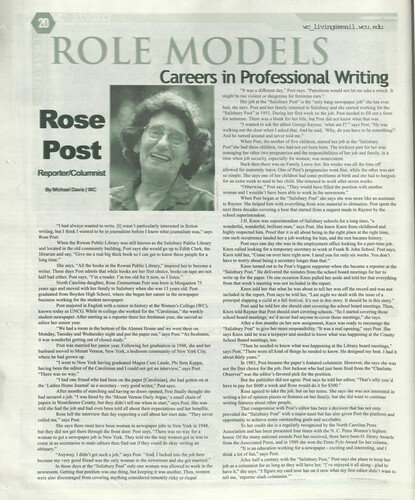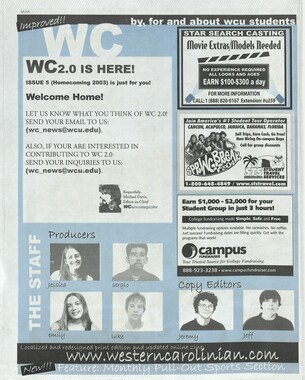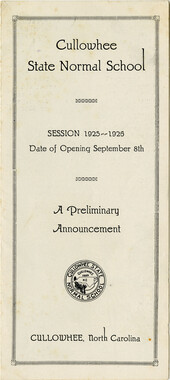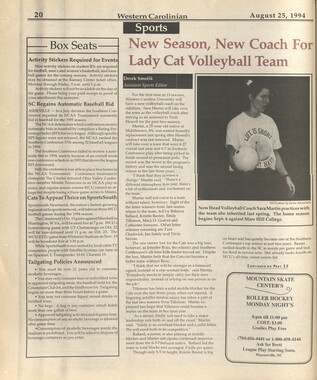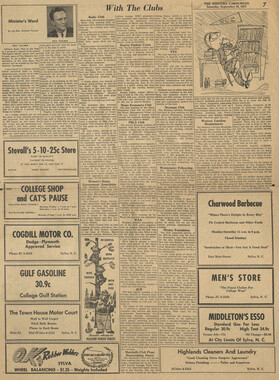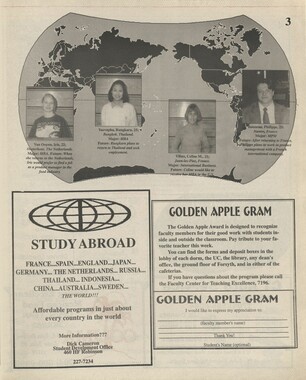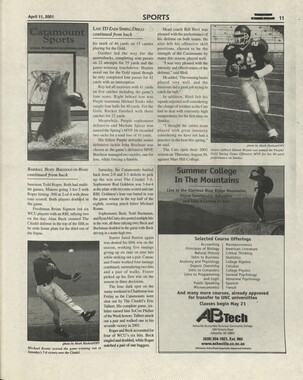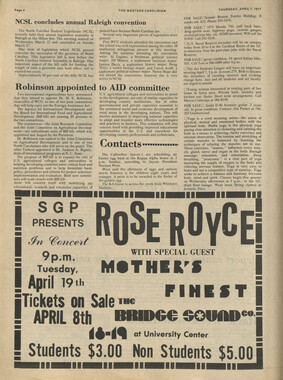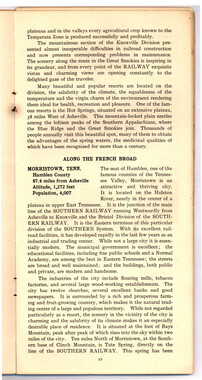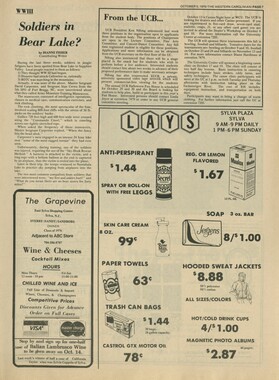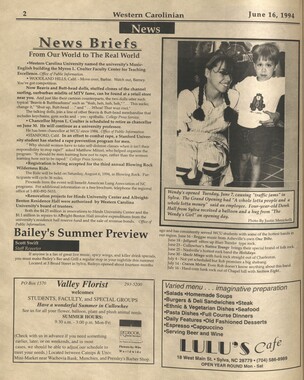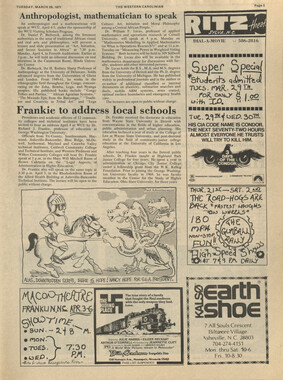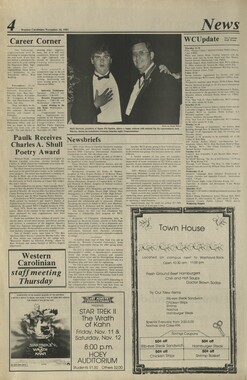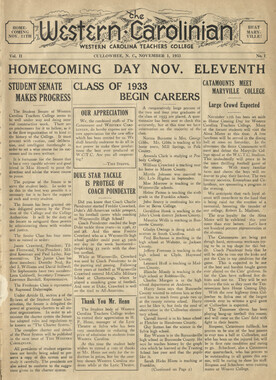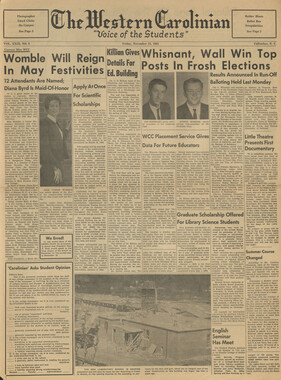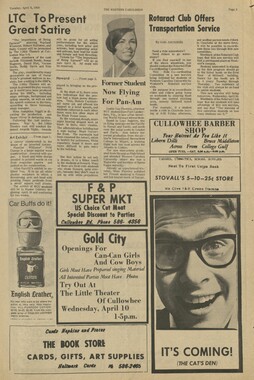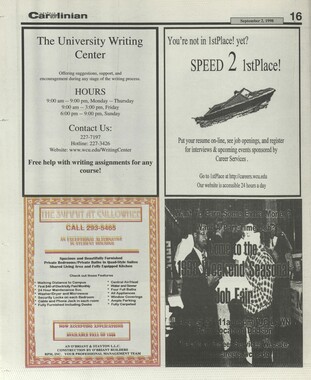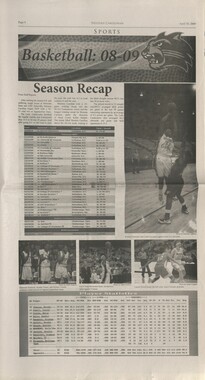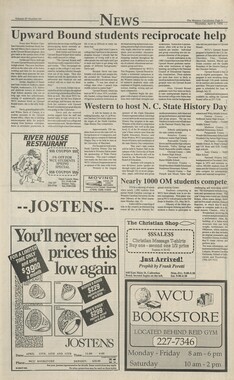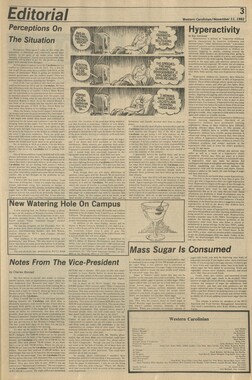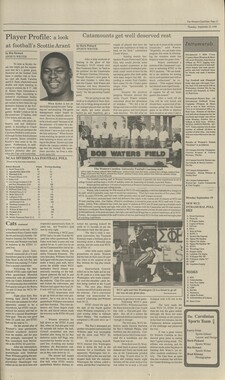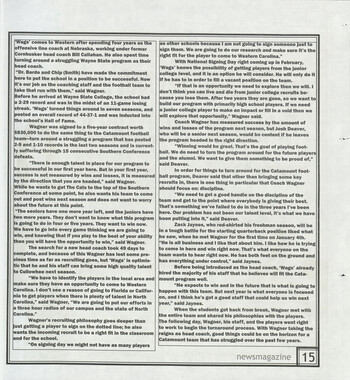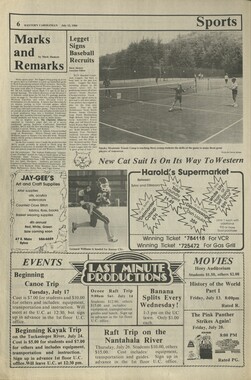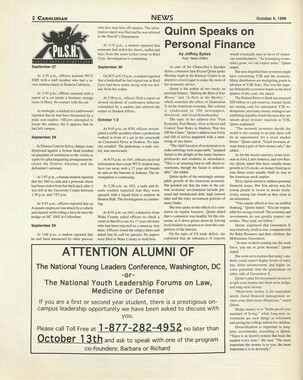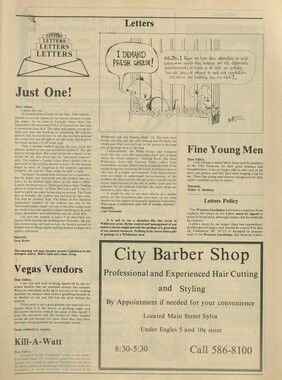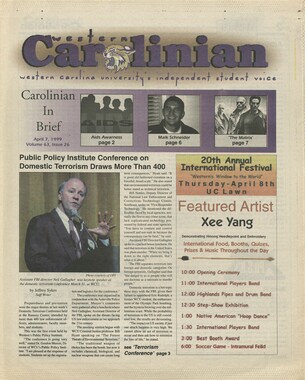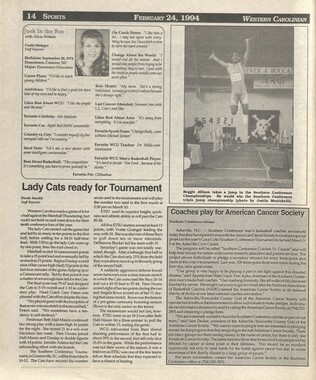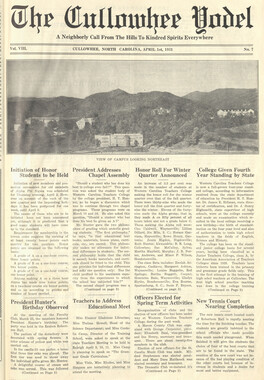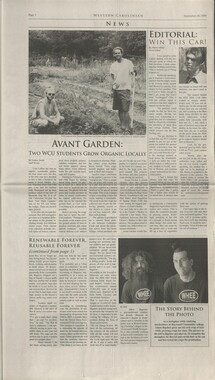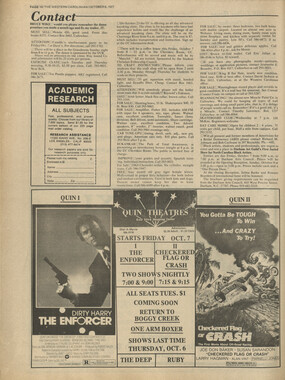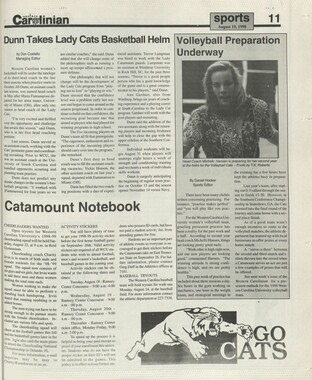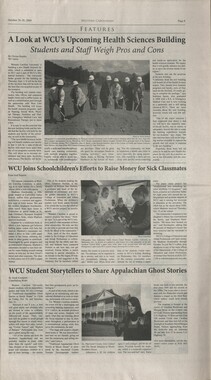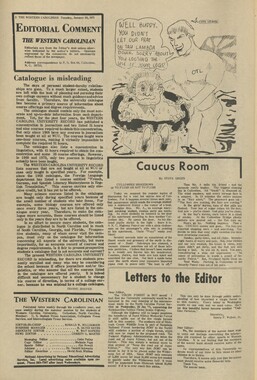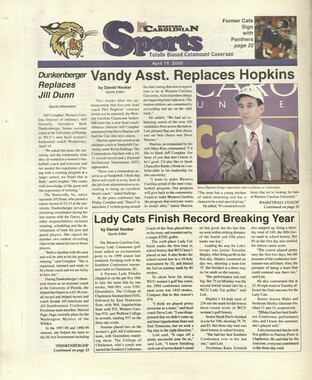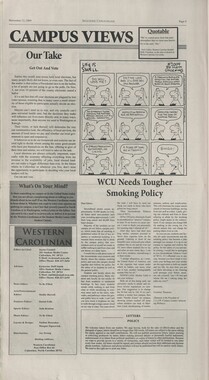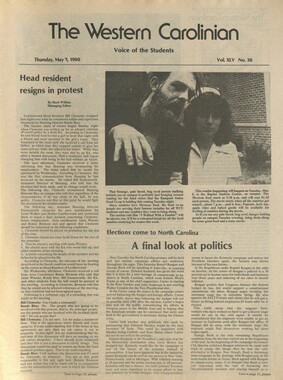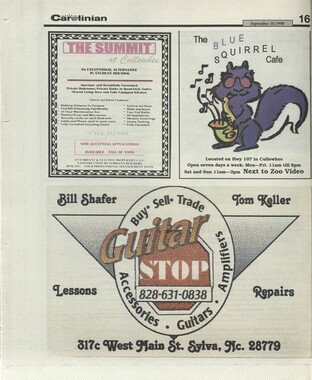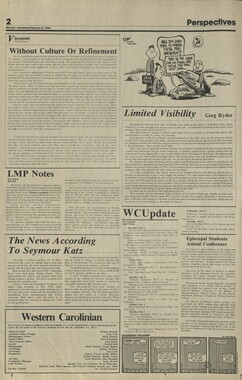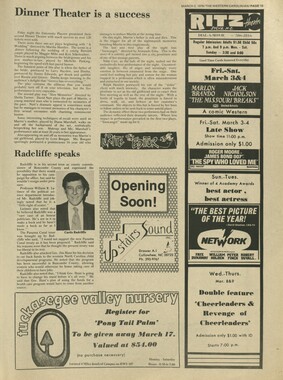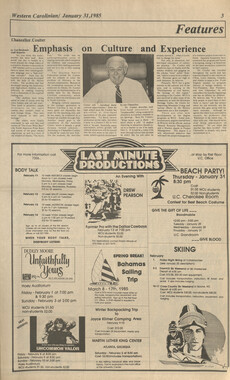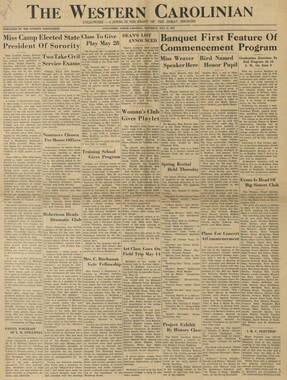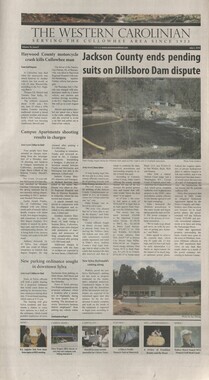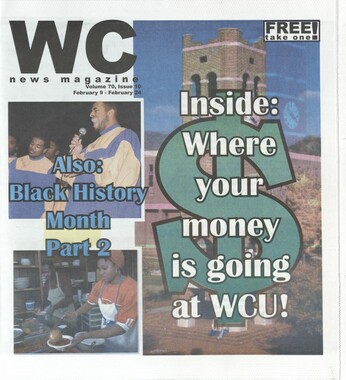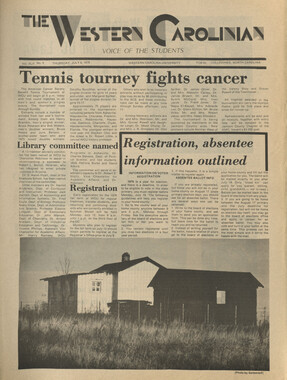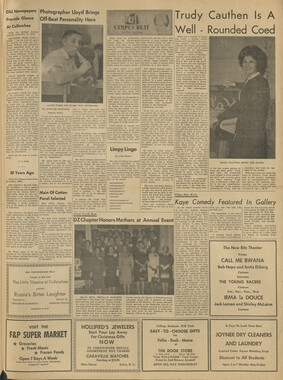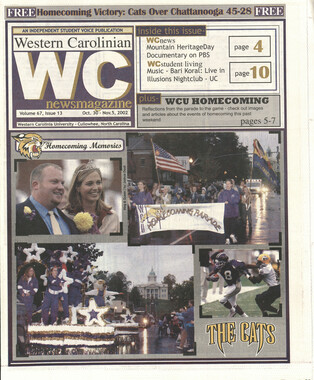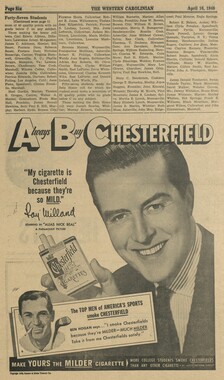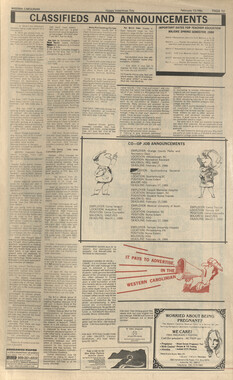Western Carolina University (21)
View all
- Canton Champion Fibre Company (2308)
- Cherokee Traditions (291)
- Civil War in Southern Appalachia (165)
- Craft Revival (1942)
- George Masa Collection (137)
- Great Smoky Mountains - A Park for America (3080)
- Highlights from Western Carolina University (422)
- Horace Kephart (998)
- Journeys Through Jackson (159)
- LGBTQIA+ Archive of Jackson County (89)
- Oral Histories of Western North Carolina (318)
- Picturing Appalachia (6617)
- Stories of Mountain Folk (413)
- Travel Western North Carolina (153)
- Western Carolina University Fine Art Museum Vitreograph Collection (129)
- Western Carolina University Herbarium (92)
- Western Carolina University: Making Memories (738)
- Western Carolina University Publications (2491)
- Western Carolina University Restricted Electronic Theses and Dissertations (146)
- Western North Carolina Regional Maps (71)
- World War II in Southern Appalachia (131)
University of North Carolina Asheville (6)
View all
- Allanstand Cottage Industries (62)
- Appalachian National Park Association (53)
- Bennett, Kelly, 1890-1974 (1463)
- Berry, Walter (76)
- Brasstown Carvers (40)
- Carver, George Washington, 1864?-1943 (26)
- Cathey, Joseph, 1803-1874 (1)
- Champion Fibre Company (233)
- Champion Paper and Fibre Company (297)
- Cherokee Indian Fair Association (16)
- Cherokee Language Program (22)
- Crowe, Amanda (40)
- Edmonston, Thomas Benton, 1842-1907 (7)
- Ensley, A. L. (Abraham Lincoln), 1865-1948 (275)
- Fromer, Irving Rhodes, 1913-1994 (70)
- George Butz (BFS 1907) (46)
- Goodrich, Frances Louisa (120)
- Grant, George Alexander, 1891-1964 (96)
- Heard, Marian Gladys (60)
- Kephart, Calvin, 1883-1969 (15)
- Kephart, Horace, 1862-1931 (313)
- Kephart, Laura, 1862-1954 (91)
- Laney, Gideon Thomas, 1889-1976 (439)
- Masa, George, 1881-1933 (61)
- McElhinney, William Julian, 1896-1953 (44)
- Niggli, Josephina, 1910-1983 (10)
- North Carolina Park Commission (105)
- Osborne, Kezia Stradley (9)
- Owens, Samuel Robert, 1918-1995 (11)
- Penland Weavers and Potters (36)
- Roberts, Vivienne (15)
- Roth, Albert, 1890-1974 (142)
- Schenck, Carl Alwin, 1868-1955 (1)
- Sherrill's Photography Studio (2565)
- Southern Highland Handicraft Guild (127)
- Southern Highlanders, Inc. (71)
- Stalcup, Jesse Bryson (46)
- Stearns, I. K. (213)
- Thompson, James Edward, 1880-1976 (226)
- United States. Indian Arts and Crafts Board (130)
- USFS (683)
- Vance, Zebulon Baird, 1830-1894 (1)
- Weaver, Zebulon, 1872-1948 (58)
- Western Carolina College (230)
- Western Carolina Teachers College (282)
- Western Carolina University (2008)
- Western Carolina University. Mountain Heritage Center (18)
- Whitman, Walt, 1819-1892 (10)
- Wilburn, Hiram Coleman, 1880-1967 (73)
- Williams, Isadora (3)
- Cain, Doreyl Ammons (0)
- Crittenden, Lorraine (0)
- Rhodes, Judy (0)
- Smith, Edward Clark (0)
- Appalachian Region, Southern (3032)
- Asheville (N.C.) (1945)
- Avery County (N.C.) (26)
- Blount County (Tenn.) (195)
- Buncombe County (N.C.) (1680)
- Cherokee County (N.C.) (283)
- Clay County (N.C.) (556)
- Graham County (N.C.) (238)
- Great Smoky Mountains National Park (N.C. and Tenn.) (535)
- Haywood County (N.C.) (3573)
- Henderson County (N.C.) (70)
- Jackson County (N.C.) (4925)
- Knox County (Tenn.) (35)
- Knoxville (Tenn.) (13)
- Lake Santeetlah (N.C.) (10)
- Macon County (N.C.) (421)
- Madison County (N.C.) (216)
- McDowell County (N.C.) (39)
- Mitchell County (N.C.) (135)
- Polk County (N.C.) (35)
- Qualla Boundary (982)
- Rutherford County (N.C.) (78)
- Swain County (N.C.) (2185)
- Transylvania County (N.C.) (270)
- Watauga County (N.C.) (12)
- Waynesville (N.C.) (86)
- Yancey County (N.C.) (72)
- Aerial Photographs (3)
- Aerial Views (60)
- Albums (books) (4)
- Articles (1)
- Artifacts (object Genre) (228)
- Bibliographies (1)
- Biography (general Genre) (2)
- Cards (information Artifacts) (38)
- Clippings (information Artifacts) (193)
- Copybooks (instructional Materials) (3)
- Crafts (art Genres) (622)
- Depictions (visual Works) (21)
- Design Drawings (1)
- Digital Moving Image Formats (2)
- Drawings (visual Works) (185)
- Envelopes (115)
- Exhibitions (events) (1)
- Facsimiles (reproductions) (1)
- Fiction (general Genre) (4)
- Financial Records (12)
- Fliers (printed Matter) (67)
- Glass Plate Negatives (381)
- Guidebooks (2)
- Internegatives (10)
- Interviews (823)
- Land Surveys (102)
- Letters (correspondence) (1070)
- Manuscripts (documents) (618)
- Maps (documents) (177)
- Memorandums (25)
- Minutes (administrative Records) (59)
- Negatives (photographs) (6090)
- Newsletters (1290)
- Newspapers (2)
- Notebooks (8)
- Occupation Currency (1)
- Paintings (visual Works) (1)
- Pen And Ink Drawings (1)
- Periodicals (194)
- Personal Narratives (10)
- Photographs (12977)
- Plans (maps) (1)
- Poetry (6)
- Portraits (4568)
- Postcards (329)
- Programs (documents) (181)
- Publications (documents) (2444)
- Questionnaires (65)
- Relief Prints (26)
- Sayings (literary Genre) (1)
- Scrapbooks (282)
- Sheet Music (2)
- Slides (photographs) (402)
- Songs (musical Compositions) (2)
- Sound Recordings (802)
- Specimens (92)
- Speeches (documents) (18)
- Tintypes (photographs) (8)
- Transcripts (329)
- Text Messages (0)
- A.L. Ensley Collection (275)
- Appalachian Industrial School Records (7)
- Appalachian National Park Association Records (336)
- Axley-Meroney Collection (2)
- Bayard Wootten Photograph Collection (20)
- Bethel Rural Community Organization Collection (7)
- Blumer Collection (5)
- C.W. Slagle Collection (20)
- Canton Area Historical Museum (2110)
- Carlos C. Campbell Collection (462)
- Cataloochee History Project (64)
- Cherokee Studies Collection (4)
- Daisy Dame Photograph Album (5)
- Daniel Boone VI Collection (1)
- Doris Ulmann Photograph Collection (112)
- Elizabeth H. Lasley Collection (1)
- Elizabeth Woolworth Szold Fleharty Collection (4)
- Frank Fry Collection (95)
- George Masa Collection (173)
- Gideon Laney Collection (452)
- Hazel Scarborough Collection (2)
- Hiram C. Wilburn Papers (28)
- Historic Photographs Collection (236)
- Horace Kephart Collection (861)
- Humbard Collection (33)
- Hunter and Weaver Families Collection (1)
- I. D. Blumenthal Collection (4)
- Isadora Williams Collection (4)
- Jesse Bryson Stalcup Collection (47)
- Jim Thompson Collection (224)
- John B. Battle Collection (7)
- John C. Campbell Folk School Records (80)
- John Parris Collection (6)
- Judaculla Rock project (2)
- Kelly Bennett Collection (1482)
- Love Family Papers (11)
- Major Wiley Parris Civil War Letters (3)
- Map Collection (12)
- McFee-Misemer Civil War Letters (34)
- Mountain Heritage Center Collection (4)
- Norburn - Robertson - Thomson Families Collection (44)
- Pauline Hood Collection (7)
- Pre-Guild Collection (2)
- Qualla Arts and Crafts Mutual Collection (12)
- R.A. Romanes Collection (681)
- Rosser H. Taylor Collection (1)
- Samuel Robert Owens Collection (94)
- Sara Madison Collection (144)
- Sherrill Studio Photo Collection (2558)
- Smoky Mountains Hiking Club Collection (616)
- Stories of Mountain Folk - Radio Programs (374)
- The Reporter, Western Carolina University (510)
- Venoy and Elizabeth Reed Collection (16)
- WCU Gender and Sexuality Oral History Project (36)
- WCU Mountain Heritage Center Oral Histories (25)
- WCU Oral History Collection - Mountain People, Mountain Lives (71)
- WCU Students Newspapers Collection (1923)
- Western North Carolina Tomorrow Black Oral History Project (69)
- William Williams Stringfield Collection (2)
- Zebulon Weaver Collection (109)
- African Americans (390)
- Appalachian Trail (35)
- Artisans (521)
- Cherokee art (84)
- Cherokee artists -- North Carolina (10)
- Cherokee language (21)
- Cherokee pottery (101)
- Cherokee women (208)
- Church buildings (190)
- Civilian Conservation Corps (U.S.) (111)
- College student newspapers and periodicals (2012)
- Dams (108)
- Dance (1023)
- Education (222)
- Floods (63)
- Folk music (1015)
- Forced removal, 1813-1903 (2)
- Forest conservation (220)
- Forests and forestry (1198)
- Gender nonconformity (4)
- Great Smoky Mountains National Park (N.C. and Tenn.) (181)
- Hunting (47)
- Landscape photography (25)
- Logging (122)
- Maps (83)
- Mines and mineral resources (9)
- North Carolina -- Maps (18)
- Paper industry (38)
- Postcards (255)
- Pottery (135)
- Railroad trains (72)
- Rural electrification -- North Carolina, Western (3)
- School integration -- Southern States (2)
- Segregation -- North Carolina, Western (5)
- Slavery (5)
- Sports (452)
- Storytelling (243)
- Waterfalls -- Great Smoky Mountains (N.C. and Tenn.) (66)
- Weaving -- Appalachian Region, Southern (280)
- Wood-carving -- Appalachian Region, Southern (328)
- World War, 1939-1945 (174)
Western Carolinian Volume 68 Number 09
Item
Item’s are ‘child’ level descriptions to ‘parent’ objects, (e.g. one page of a whole book).
-
-
Careers i in Professional Writing Post Reporter/Collummist By (Nitictineeel| [Deawiis || WC J had always wanted to write. [I] wasnt particularly interested in fiction writing, but I think I wanted to be in journalism before I knew what journalism was, says Rose Post. When the Rowan Public Library was still known as the Salisbury Public Library and located in the old community building, Post says she would go up to Edith Clark, the librarian and say, Give me a real big thick book so I can get to know these people for a long time. She says, All the books in the Rowan Public Library, inspired her to become a writer. These days Post admits that while books are her first choice, books on tape are not half bad either. Post says, Im a reader. Im too old for it now, so I listen. North Carolina daughter, Rose Zimmerman Post was born in Morganton 75 years ago and moved with her family to Salisbury when she was 13 years old. Post graduated from Boyden High School, where she began her career in the newspaper business working for the student newspaper. Post majored in English with a minor in history at the Womens College (WC), known today as UNCG. While in college she worked for the Carolinian, the weekly student newspaper. After starting as a reporter there her freshman year, she served as editor her senior year. We had a room in the bottom of the Alumni House and we went there on Monday, Tuesday and Wednesday night and put the paper out, says Post. As freshmen, it was wonderful getting out of closed study. Post was married her junior year. Following her graduation in 1948, she and her husband moved to Mount Vernon, New York, a bedroom community of New York City, where he had grown up. I went to New York having graduated Magna Cum Laude, Phi Beta Kappa, having been the editor of the Carolinian and I could not get an interview, says Post. There was no way. T had one friend who had been on the paper [Carolinian], she had gotten on at the Ladies Home Journal as a secretary - very good writer, Post says. After months of searching and having no doors opened, Post finally thought she had secured a job. I was hired by the Mount Vernon Daily Argus, a small chain of papers in Westchester County, but they didnt tell me when to start, says Post. She was told she had the job and had even been told all about their expectations and her benefits. Rose left the interview that day expecting a call about her start date. They never called me, says Post. She says there must have been women in newspaper jobs in New York in 1948, but they did not get there through the front door. Post says, There was no way for a woman to get a newspaper job in New York. They told me the way women got in was to come in as secretaries to male editors then find out if they could do okay writing an obituary. Anyway, I didnt get such a job, says Post. And, I lucked into the job here because my very good friend was the only woman in the newsroom and she got married. In those days at the Salisbury Post only one woman was allowed to work in the newsroom. Getting that position was one thing, but keeping it was another. Then, women were also discouraged from covering anything considered remotely risky or risqu. we living@email wwou.edu Tt was a different day, Post says. teas would not let me take a wreck. It might be too violent or dangerous for feminine ears. Her job at the Salisbury Post is the only bang newspaper job she has ever had, she says. Post and her family returned to Salisbury and she started working for the Salisbury Post in 1951. During her first week on the job, Post needed to fill out a form for someone. There was a blank for her title, but Post did not know what that was. T wanted to ask the editor George Raynor, what am I? says Post. He was walking out the door when I asked that. And he said, Why, do you have to be something? And he turned around and never told me. When Post, the mother of five children, started her job at the Salisbury Postshe had three children, two had not yet been born: The trickiest part for her was managing her other two pregnancies and the responsibilities of her job and family, in a time when job security, especially for women, was nonexistent. Back then there was no Family Leave Act. Six weeks was all the time off allowed for maternity leave. One of Posts pregnancies went fine, while the other was not so simple. She says one of her children had some problems at birth and she had to bargain for an extra week to tend to her child. She returned to work after seven weeks. Otherwise, Post says, They would have filled the position with another woman and I wouldnt have been able to work in the newsroom. When Post began at the Salisbury Post she says she was more like an assistant to Raynor. She helped him with everything from wire material to obituaries. Post spent the next three decades covering a beat that started from a request made to Raynor by the school superintendent. J.H. Knox was superintendent of Salisbury schools for a long time, a wonderful, wonderful, brilliant man, says Post. She knew Knox from childhood and highly respected him. Proof that it is all about being in the right place at the right time, one such occurrence landed her a job working for him, and the rest became history. Post says one day she was in the employment office looking for a part-time job. Knox called looking for a temporary secretary to work at Frank B. John School. Post says, Knox told her, Come on over here right now. I need you for only six weeks. You dont have to worry about being a secretary longer than that. Knox turned out to be Posts biggest supporter when she became a reporter at the Salisbury Post. He delivered the minutes from the school board meetings for her to write up for the paper. On one occasion Knox pulled her aside and told her that everything from that weeks meeting was not included in the report. Knox told her that what he was about to tell her was off the record and was not included in the report. Post says he told her, Last night we dealt with the issue of a principal slapping a cuild at a fall festival. Its not in this story. It should be in this story. Post said he told her she should start covering the school board meetings. Then, Knox told Raynor that Post should start covering schools. So I started covering those school board meetings; wed never had anyone to cover those meetings, she says. After a few months on her new assignment, Knox was ready to encourage the Salisbury Post to give her more responsibility. It was a real opening, says Post. She says Knox said he was a taxpayer and needed to know what was happening at the County School Board meetings, too. Then he needed to know what was happening at the Library board meetings, says Post. There were all kind of things he needed to know. He designed my beat. I had it about thirty years. In 1983, Post became the papers featured columnist. However, she says she was not the first choice for the job. Dot Jackson who had just been fired from the Charlotte Observer was the editors favored pick for the position. But the publisher did not agree. Post says he told her editor, Thats silly youd have to pay her $600 a week and Rose would do it for $300. Rose agreed to take the job, but on her terms. She says she was not interested in writing a lot of opinion pieces or features on her family, but she did want to continue writing features about other people. That compromise with Posts editor has been a decision that has not only provided the Salisbury Post with a major asset but has also given Post the platform and opportunity to achieve some outstanding goals and accolades. To her credit she is a regularly recognized by the North Carolina Press Association and has been presented four times with the N. C. Press Womens highest honor. Of the many national awards Post has received, three have been O. Henry Awards from the Associated Press, and in 1989 she won the Ernie Pyle Award for her column, Tt is an education working for a newspaper - exciting and interesting, and I think a lot of fun, says Post. After half a century with the Salisbury Post, Post says she plans to keep her job as a columnist for as long as they will have her. Ive enjoyed it all along - glad to have it, she says. I figure my card now has on it now what my first editor didnt want to tell me, reporter slash columnist.
Object
Object’s are ‘parent’ level descriptions to ‘children’ items, (e.g. a book with pages).
-
The Western Carolinian is Western Carolina University's student-run newspaper. The paper was published as the Cullowhee Yodel from 1924 to 1931 before changing its name to The Western Carolinian in 1933.
-

